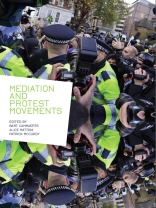Over the past year, international and national media have been full of stories about protest movements and tumultuous social upheaval from Tunisia to California. But scholars have not yet fully addressed the connection between these movements and the media and communication channels through which their messages spread. Correcting that imbalance, Mediation and Protest Movements explores the nature of the relationship between protest movements, media representation, and communication strategies and tactics.
In a series of fascinating essays, contributors to this timely volume focus on the processes and practices in which contemporary protesters engage when acting with and through media. Covering both online and offline contexts as well as mainstream and alternative media, they consider media environments around the world in all their complexity. They also provide a broad and comparative perspective on the ways that protest movements at local and transnational levels engage in mediation processes and develop media practices. Bridging the gap between social movement theory and media and communication studies,
Mediation and Protest Movements will serve as an important reference for students and scholars of the media and social change.
Table of Content
Introduction
Chapter 1: Bridging research on democracy, social movements and communication – Donatella della Porta
Chapter 2: Repertoires of communication in social movement processes – Alice Mattoni
Chapter 3: Mediation, practice and lay theories of news media – Patrick Mc Curdy
Chapter 4: Internet cultures and protest movements: the cultural links between strategy, organizing and online communication – Anastasia Kavada
Chapter 5: Transmedia mobilization in the Popular Association of the Oaxacan Peoples, Los Angeles – Sasha Costanza-Chock
Chapter 6: Mediated nonviolence as a global force: an historical perspective 115 Sean Scalmer
Chapter 7: Walk, talk, fax or tweet: reconstructing media-movement interactions through group history telling – Charlotte Ryan, Karen Jeff reys, Taylor Ellowitz and Jim Ryczek
Chapter 8: Calling for confrontational action in online social media: video activism as auto-communication – Julie Uldam and Tina Askanius
Chapter 9: Activists’ communication in a post-disaster zone: cross-media strategies for protest mobilization in L’Aquila, Italy – Cinzia Padovani
Chapter 10: Imagining Heiligendamm: visual struggles and the G8 summit 2007 – Simon Teune
Chapter 11: Social movements, contentious politics and media in the Philippines – Lisa Brooten
Chapter 12: Protest movements and their media usages – Dieter Rucht
About the author
Bart Cammaerts is Senior Lecturer and Director of the Ph.D. program in the Department of Media and Communications at the London School of Economics and Political Science (LSE). He is the former chair of the Communication and Democracy Section of ECREA and vice-chair of the Communication Policy and Technology section of IAMCR. His most recent books include Mediation and Protest Movements (with Alice Matoni and Patrick Mc Curdy, Intellect, 2013), Internet-Mediated Participation beyond the Nation State (Manchester University Press, 2008) and Understanding Alternative Media (with Olga Bailey and Nico Carpentier, Open University Press, 2008).












